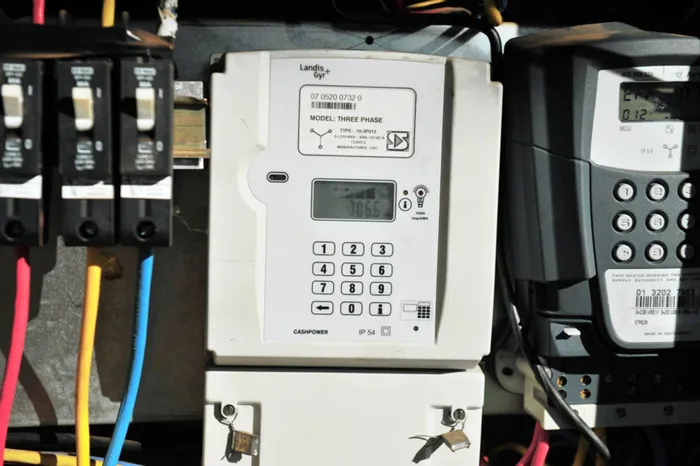
Eskom's smart meter rollout in KwaZulu-Natal, starting October 2025, aims to revolutionise electricity management, enhance customer experience, and eliminate load reduction challenges across South Africa.
Image: File
Eskom has ramped up its national smart meter rollout, kicking off installations in KwaZulu-Natal last week Monday. The power utility said the project is part of a broader plan to modernise the national grid and improve the way customers experience electricity supply.
The goal is ambitious but Eskom vowed to help put an end to load reduction challenges within the next 12 to 18 months. Over the next three years, Eskom aims to install 7.2 million smart meters across South Africa. The current phase of the rollout is expected to benefit about 800,000 customers.
Smart meters are becoming a central part of Eskom’s plan to address its financial and operational challenges, including growing debt and widespread electricity theft.
According to the power utility, the new technology will allow it to remotely disconnect users who don’t pay, helping to protect paying customers from the consequences of non-payment.
The meters are also meant to tighten control over the grid. They make it easier to detect tampering and illegal electricity sales, and give Eskom more accurate data to plan ahead and respond to issues more quickly. Because the technology removes the need for manual readings, it can also lower operational costs.
Another aim of the rollout is to expand access to Free Basic Electricity (FBE) for qualifying households. Currently, only 485,000 of Eskom’s 2.1 million eligible customers receive this benefit. Smart meters would allow the government to “front-load” the 50 kWh monthly allocation, potentially reaching more households.
For users, the meters provide real-time information about consumption and remove the reliance on estimated bills. This could make it easier for households to budget and monitor their usage. The system also supports Time-of-Use pricing, which charges different rates depending on the time of day, allowing people to shift some usage to cheaper off-peak hours if they choose.
Eskom has asked customers to ensure its teams can safely access meter boxes during installation. It is worth noting that the rollout is not optional and older meters will eventually be replaced and taken out of use.
The utility has also introduced an incentive scheme linked to the new technology. Households with fully activated smart meters and no outstanding payments can receive R90 a month if they agree to let Eskom remotely limit their electricity supply during peak demand periods. Participants will receive an SMS alert an hour before a “load limiting” event and are encouraged to switch off high-usage appliances like geysers and stoves to avoid disconnection.
These events can take place up to 10 times a month and last for no more than two hours. Customers who comply receive the R90 either as a prepaid token or as a credit on their post-paid account.
The smart meter rollout comes at a time when Eskom is under severe financial pressure.
Municipalities collectively owe the utility more than R100 billion, while customers owe municipalities more than R400 billion.
Eskom’s chief financial officer, Caleb Cassim, recently cautioned that municipal debt to the utility could surpass R300 billion within the next five years if the situation doesn’t improve.
Electricity theft remains a major contributor to these financial problems. In the 2024/25 financial year alone, Eskom recorded R7.1 billion in losses due to theft and other non-technical energy losses.
The rollout of smart meters is also part of a broader government strategy to address municipal financial instability. The National Treasury is implementing a $113 million (around R2 billion) programme over three years to support municipalities in tightening revenue collection and improving accountability.
Last year, 67,000 smart meters were installed across 18 municipalities. According to Treasury, areas such as Sol Plaatjie and Bela Bela saw better payment rates to Eskom after the rollout. These municipalities were then able to benefit from a one-third debt write-off as part of an incentive for improved financial performance.
Despite the potential benefits, the rollout has met with sharp criticism and operational challenges.
Concerns have been raised over Eskom's control over consumer usage and the remote control devices. Questions have also been raised over fraud and operational issues.
In Johannesburg, the electricity utility City Power temporarily suspended all prepaid meter conversions from August 27 to November 1, 2025, pending a thorough review. Concerns raised included customers who became non-vending” (no longer purchasing electricity) after conversion, and discrepancies in accounts not accurately reflecting on City Power’s systems.
The power utility has urged customers to be vigilant, cautioning them to only allow identifiable, confirmed contractors into their homes to install the new smart meters, and advising them to check that their area is currently scheduled for the rollout. Customers whose meters are replaced will have any remaining credit either refunded or transferred into the new meter.
IOL
Related Topics: